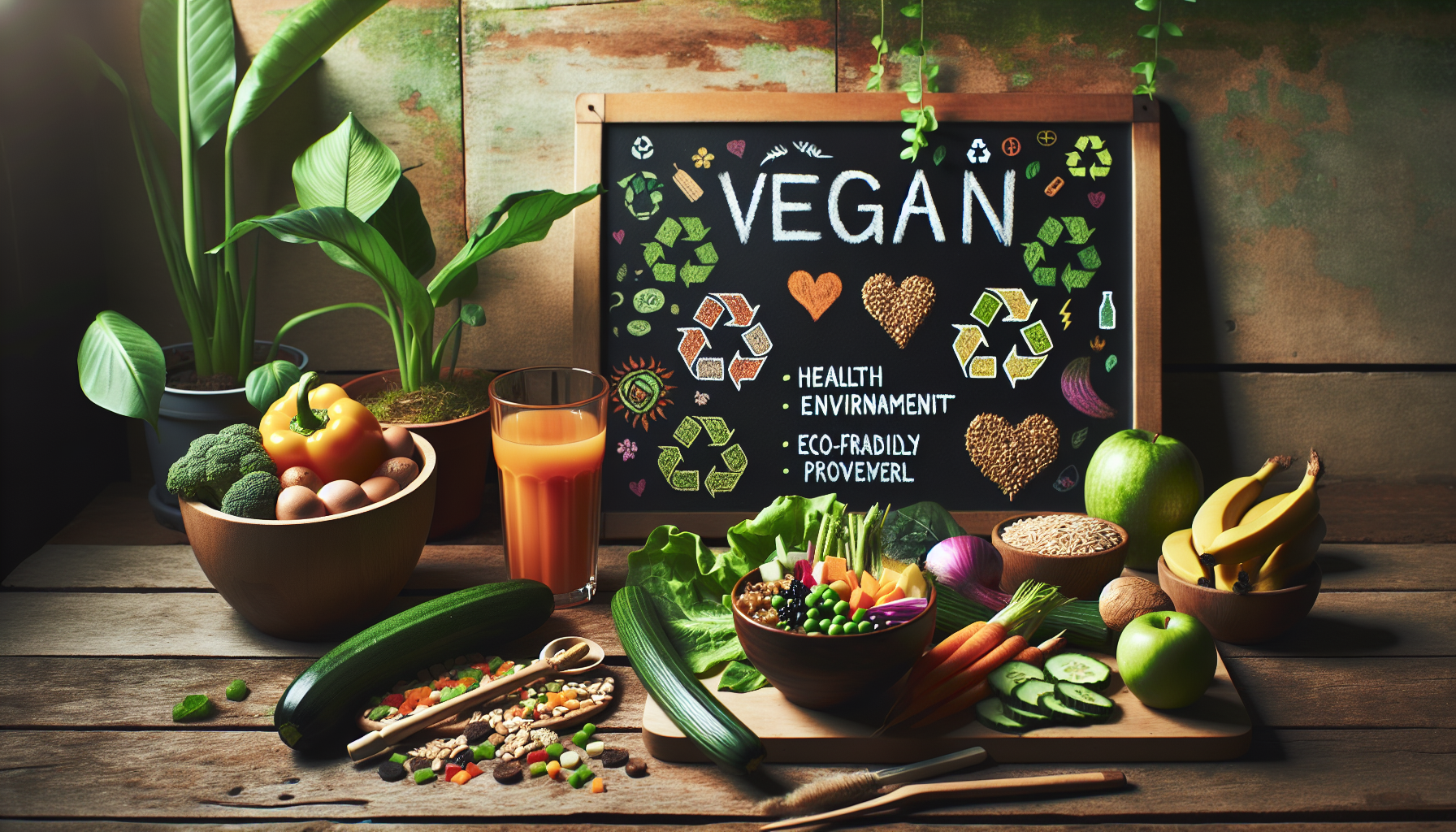Imagine living a life filled with vibrant energy, optimal health, and a deep sense of compassion towards all living beings. That is exactly what awaits you in the world of a plant-based vegan lifestyle. By embracing this way of living, you align yourself with the power of nature and nourish your body with wholesome, plant-derived foods. Say goodbye to the conventional norms of a diet centered around animal products, and say hello to a new and exciting journey towards vitality and sustainability. This article will guide you through the incredible benefits, practical tips, and delicious recipes that will make your transition into a plant-based vegan lifestyle a seamless and enjoyable experience. Get ready to unlock the secret to a truly enriching and fulfilling life!
Table of Contents
What is a Plant Based Vegan Lifestyle?
Definition of a Plant Based Vegan Lifestyle
A plant based vegan lifestyle refers to a way of living where individuals choose to consume only plant-based foods and avoid all forms of animal products, including meat, dairy, eggs, and honey. It is a conscious decision to prioritize foods that come from the earth, such as fruits, vegetables, whole grains, legumes, nuts, and seeds, and exclude any animal-derived ingredients or by-products. This lifestyle also extends beyond just dietary choices and often includes adopting ethical practices that prioritize animal welfare and sustainable living.
Benefits of Adopting a Plant Based Vegan Lifestyle
There are numerous benefits to adopting a plant based vegan lifestyle. Firstly, it promotes overall health and well-being. Plant-based diets are typically rich in nutrients and fiber, which can support healthy digestion, lower cholesterol levels, and reduce the risk of chronic diseases such as heart disease, diabetes, and certain types of cancer. Additionally, plant based vegan diets are often lower in saturated fats and cholesterol, which can contribute to improved cardiovascular health.
Furthermore, a plant based vegan lifestyle can also aid in weight management. Plant-based foods are generally lower in calories and higher in fiber, promoting feelings of fullness and reducing the likelihood of overeating. This, coupled with regular exercise, can contribute to maintaining a healthy weight or achieving weight loss goals.
Lastly, adopting a plant based vegan lifestyle has positive environmental implications. The plant-based diet requires fewer natural resources, such as land and water, compared to animal agriculture. By reducing the demand for animal products, individuals can help minimize deforestation, conserve water resources, and mitigate greenhouse gas emissions, thereby contributing to a sustainable and eco-friendly future.
Transitioning to a Plant Based Vegan Lifestyle
Understanding the Principles of Plant Based Veganism
Before embarking on a plant based vegan lifestyle, it is essential to understand the principles and values that underpin this lifestyle choice. This includes recognizing that animals deserve compassion and respect, acknowledging the environmental impact of animal agriculture, and prioritizing sustainable practices that promote a healthier planet. By understanding these principles, individuals can form a stronger commitment to the lifestyle and make informed choices that align with their values.
Gradual vs. Immediate Transition
Transitioning to a plant based vegan lifestyle can be done gradually or immediately, depending on individual preferences. Some individuals may find it easier to make incremental changes to their diet and gradually phase out animal products over time. This approach allows for a more seamless transition and gives individuals the opportunity to explore and adapt to new flavors, plant-based recipes, and cooking techniques. On the other hand, some individuals may prefer to make a rapid and immediate shift to a plant based vegan diet. This approach requires more dedication and planning but can provide a sense of momentum and commitment right from the start. Ultimately, the choice of transition style depends on personal preference and what feels most sustainable in the long run.
Planning Meals and Grocery Shopping
To successfully transition to a plant based vegan lifestyle, it is essential to plan meals and grocery shopping in advance. Start by researching and experimenting with plant-based recipes to discover exciting and delicious meal options. Make a list of essential ingredients and staples that will form the foundation of your plant-based pantry, such as beans, lentils, whole grains, nuts, and seeds. When grocery shopping, focus on the produce section, stocking up on fresh fruits and vegetables that will serve as the main components of your meals. By planning ahead and ensuring you have a well-stocked pantry, you will be better prepared to make nutritious and flavorful plant-based meals.
Finding Plant-Based Substitutes
One common concern when transitioning to a plant based vegan lifestyle is finding suitable substitutes for animal-based products. Luckily, there are now a wide variety of plant-based alternatives available on the market. For example, soy or almond milk can be used as substitutes for dairy milk, chickpea or lentil flour can replace eggs in baking recipes, and tofu or tempeh can serve as protein-rich alternatives to meat. Additionally, many supermarkets now carry plant-based meat substitutes, such as veggie burgers or plant-based sausages, which can be used in place of traditional meat products. Exploring these substitutes and experimenting with different ingredients can help make the transition to a plant based vegan lifestyle more enjoyable and sustainable.

Nutritional Considerations
Understanding the Nutrient Requirements of a Plant Based Vegan Diet
A well-planned plant based vegan diet can provide all the essential nutrients necessary for maintaining good health. However, it is important to be mindful of certain nutrients that may require special attention. For example, plant-based diets may require additional sources of protein, iron, calcium, omega-3 fatty acids, and vitamin B12. By carefully selecting a variety of plant-based foods and ensuring adequate servings of protein-rich sources, such as legumes, tofu, tempeh, and quinoa, individuals can meet their nutritional needs without relying on animal products.
Protein Sources for Vegans
Protein is an essential macronutrient that plays a crucial role in building and repairing tissues, promoting healthy muscle function, and supporting a strong immune system. While animal products are commonly associated with protein, there are plenty of plant-based sources that can provide all the necessary amino acids. Legumes, such as lentils, beans, and chickpeas, are excellent sources of plant-based protein. Other protein-rich foods include tofu, tempeh, seitan, quinoa, hemp seeds, and chia seeds. Incorporating a variety of these protein sources into meals can ensure that your plant-based diet meets your protein needs.
Getting Essential Vitamins and Minerals
Plant-based diets can provide an abundance of essential vitamins and minerals. However, it is important to pay attention to specific nutrients that may require additional consideration. Calcium, for example, is necessary for maintaining healthy bones and teeth. Good plant-based sources of calcium include leafy green vegetables, tofu, fortified plant-based milk, and almonds. Iron is another critical nutrient that is needed for the production of red blood cells. Plant-based sources of iron include legumes, spinach, quinoa, and fortified cereals. Additionally, omega-3 fatty acids can be obtained from flaxseeds, chia seeds, walnuts, and algae-based supplements. By incorporating a variety of plant-based foods, individuals can ensure they are meeting their nutritional needs.
Avoiding Deficiencies
When transitioning to a plant based vegan lifestyle, it is important to be mindful of potential nutrient deficiencies that may occur due to the exclusion of animal products. Vitamin B12, for example, is primarily found in animal-based products, and its deficiency can lead to anemia and neurological problems. To avoid deficiencies, consider taking a B12 supplement or consuming fortified foods, such as plant-based milks or breakfast cereals. Additionally, individuals should also ensure they are getting enough vitamin D, iodine, and zinc, as these nutrients are commonly found in animal products. By understanding the potential deficiencies and taking proactive measures, individuals can maintain a nutritionally balanced and healthy plant-based vegan diet.
Debunking Common Myths about Vegan Nutrition
There are several misconceptions surrounding plant-based vegan diets and their ability to meet nutritional needs. One common myth is that it is difficult to obtain enough protein on a plant-based diet. However, as mentioned earlier, there are numerous plant-based protein sources available. Another myth is that plant-based diets lack essential vitamins and minerals. With careful planning and a varied diet, individuals can easily obtain all necessary nutrients from plant-based foods. Lastly, some may believe that plant-based diets are inadequate for children or athletes. However, numerous studies have shown that properly planned plant-based diets can meet the nutritional needs of individuals of all ages and activity levels. By addressing these myths and understanding the facts, individuals can feel confident that a plant-based vegan lifestyle can provide all the necessary nutrition.
Health Benefits of a Plant Based Vegan Lifestyle
Reduced Risk of Chronic Diseases
A plant based vegan lifestyle has been associated with a reduced risk of chronic diseases such as heart disease, diabetes, and certain types of cancer. Plant-based diets are naturally low in saturated fats and cholesterol, which are known risk factors for heart disease. Additionally, the abundance of fiber, antioxidants, and phytochemicals found in plant-based foods can promote heart health by reducing inflammation, improving cholesterol levels, and supporting healthy blood pressure. Similarly, consuming a plant-based vegan diet can help regulate blood sugar levels and reduce the risk of developing type 2 diabetes. The high fiber content in plant-based foods can slow down the absorption of glucose, promoting stable blood sugar levels. Moreover, the consumption of fruits, vegetables, and whole grains has been associated with a lower risk of certain cancers. By adopting a plant based vegan lifestyle, individuals can significantly lower their risk of developing these chronic diseases and enjoy long-term health benefits.
Weight Management
Another significant health benefit of a plant based vegan lifestyle is its potential for weight management. Plant-based diets tend to be lower in calories compared to those that include animal products. The abundance of fruits, vegetables, whole grains, and legumes, all of which are staples in a plant-based diet, are nutrient-dense and lower in calorie density. This means that individuals can enjoy larger portions of these foods while still consuming fewer calories. Additionally, the high fiber content in plant-based foods promotes feelings of fullness and helps to control appetite, reducing the likelihood of overeating. By maintaining a healthy body weight or achieving weight loss goals, individuals can reduce their risk of developing obesity-related health conditions such as heart disease, diabetes, and joint problems.
Improved Digestion
A plant based vegan lifestyle can also support improved digestion and gastrointestinal health. Plant-based foods are rich in dietary fiber, which plays a crucial role in maintaining a healthy digestive system. Fiber promotes regular bowel movements, prevents constipation, and supports the growth of beneficial gut bacteria. By ensuring an adequate intake of fiber through a plant-based diet, individuals can effectively prevent digestive issues and maintain optimal digestive health. Additionally, plant-based diets tend to be lower in saturated fats and higher in unsaturated fats, which can further benefit digestion by reducing the risk of conditions such as gallstones and promoting a healthy gut microbiome.
Boosted Energy Levels
Many individuals who adopt a plant based vegan lifestyle report experiencing increased energy levels throughout the day. This can be attributed to several factors. Firstly, plant-based diets are rich in complex carbohydrates, which are the body’s primary source of energy. Consuming foods such as whole grains, legumes, and fruits throughout the day can provide sustained energy levels and prevent energy crashes often associated with highly processed and sugary foods. Additionally, plant-based diets are typically low in unhealthy fats and easy to digest, allowing the body to efficiently utilize energy for daily activities. Lastly, the high nutrient content in plant-based foods can support overall vitality and wellness, contributing to a general sense of well-being and increased energy levels throughout the day.
Enhanced Mental Well-being
The impact of a plant based vegan lifestyle extends beyond physical health and can also positively influence mental well-being. Numerous studies have shown a correlation between the consumption of plant-based diets and improved mental health outcomes. Certain nutrients found in plant-based foods, such as omega-3 fatty acids, antioxidants, and B vitamins, have been associated with a reduced risk of depression and improved mood. Additionally, the consumption of fruits and vegetables, which are rich in important vitamins and minerals, can support brain health and cognitive function. The ethical values often associated with a plant based vegan lifestyle, such as compassion and mindfulness, can also contribute to increased happiness and mental well-being.

Environmental Impact
Reducing Carbon Footprint
One of the significant benefits of adopting a plant based vegan lifestyle is the positive impact on the environment, particularly in terms of reducing carbon footprint. Animal agriculture is a significant contributor to greenhouse gas emissions, primarily due to methane released by livestock and the deforestation associated with animal farming. By choosing a plant-based diet, individuals can significantly reduce their carbon footprint. The production of plant-based foods generally requires fewer resources, such as land and water, compared to animal agriculture. By reducing the demand for animal products, individuals can actively contribute to mitigating climate change and promoting a more sustainable future.
Conserving Water Resources
Animal agriculture is also a significant consumer of water resources. From watering crops to the hydration needs of livestock, animal farming requires massive amounts of water. By shifting to a plant-based vegan lifestyle, individuals can help conserve water resources. Plant-based diets typically use significantly less water to produce the same amount of food compared to animal-based diets. This reduction in water usage can help alleviate strain on water supplies, especially in regions prone to drought or water scarcity. By making this conscious choice, individuals can actively contribute to the preservation of this precious resource.
Preserving Biodiversity
Deforestation is a major consequence of land use for animal agriculture. The clearing of land for grazing and feed crops leads to the destruction of forests and natural habitats, resulting in the loss of biodiversity. By adopting a plant based vegan lifestyle, individuals can help combat deforestation and protect biodiversity. Plant-based diets require less land and can be produced using sustainable farming practices that reduce the need for clear-cutting forests. By choosing to prioritize plant-based foods, individuals can actively contribute to the preservation of ecosystems and the protection of countless plant and animal species.
Mitigating Deforestation
One of the leading causes of deforestation globally is the expansion of agricultural land for livestock production. Deforestation not only destroys vital habitats and contributes to climate change but also threatens the livelihoods of indigenous communities and accelerates species extinction rates. By shifting to a plant-based vegan lifestyle, individuals can play a role in mitigating deforestation. Plant-based diets generally require less land, reducing the demand for new agricultural land and minimizing environmental destruction. By supporting sustainable farming practices and choosing plant-based alternatives, individuals can contribute to the preservation of forests and the protection of endangered species.
Sustainable Farming Practices
In addition to reducing the negative environmental impact of industrial animal farming, adopting a plant based vegan lifestyle also promotes sustainable farming practices. Plant-based diets are typically centered around locally sourced, organic, and seasonal produce. By choosing foods that are grown sustainably, individuals can support agricultural practices that prioritize soil health, water conservation, and biodiversity. Additionally, by reducing the demand for animal products, individuals can encourage a shift towards regenerative agriculture, which focuses on rebuilding soil health and utilizing more sustainable farming methods. By making conscious choices about the foods we consume, individuals can actively contribute to a more sustainable and resilient food system.
Social and Ethical Considerations
Animal Welfare and Compassion
Supporting animal welfare and showing compassion towards all living beings is a fundamental aspect of a plant-based vegan lifestyle. By choosing not to consume animal products, individuals are actively taking steps to minimize harm and suffering to animals. The ethical stance of veganism recognizes that animals are sentient beings with their own interests and desires, and they deserve to live their lives free from exploitation and cruelty. By adopting a plant-based vegan lifestyle, individuals align their actions with their values, promoting a kinder and more compassionate society.
Addressing Ethical Concerns
Transitioning to a plant based vegan lifestyle often stems from ethical concerns surrounding the treatment of animals and the environmental impact of animal agriculture. By addressing these concerns and taking action through dietary choices, individuals can align their lifestyles with their values. Furthermore, choosing plant-based options encourages businesses and food producers to prioritize ethical and sustainable practices. By supporting companies that uphold high standards of animal welfare and environmental responsibility, individuals can actively contribute to creating a more ethical and sustainable food system.
Supporting Cruelty-Free and Sustainable Practices
Adopting a plant based vegan lifestyle goes beyond just individual dietary choices; it is also a way to support cruelty-free and sustainable practices. Choosing plant-based alternatives to animal-based products sends a clear message to industries that there is a demand for more sustainable and ethical choices. With the growing popularity of plant-based diets, companies are increasingly developing innovative plant-based alternatives that offer the same taste and texture as animal products. By supporting these cruelty-free options and demanding sustainability, individuals can drive positive change and contribute to a more compassionate and eco-friendly future.
Challenges and Tips for Maintaining a Plant Based Vegan Lifestyle
Dealing with Social Situations and Dining Out
One of the challenges of maintaining a plant-based vegan lifestyle is navigating social situations and dining out. When attending events or dining with friends and family, it may be difficult to find plant-based options. However, there are several strategies to overcome this challenge. When invited to social gatherings, offer to bring a plant-based dish to share, ensuring there is a delicious option available for yourself and others. When dining out, do some research in advance and identify vegan-friendly restaurants or options on the menu. Many restaurants now offer plant-based alternatives or can make accommodations upon request. By being prepared and proactive, individuals can maintain their plant-based vegan lifestyle without compromising their social life.
Overcoming Cravings and Temptations
Cravings for familiar foods, such as cheese or meat, may arise when transitioning to a plant-based vegan lifestyle. It is important to remember that cravings are normal and often temporary. To overcome these cravings, focus on incorporating a wide variety of flavors, textures, and spices into your plant-based meals. Additionally, experimenting with different cooking techniques and plant-based substitutes can help satisfy cravings for familiar tastes. Be open to trying new recipes and exploring different cuisines to discover exciting and satisfying plant-based alternatives. Over time, as your taste buds adapt and you discover new favorites, the cravings for animal products are likely to diminish.
Staying Motivated
Staying motivated on a plant-based vegan lifestyle journey is important for long-term success. One effective way to stay motivated is to continually educate yourself about the benefits of a plant-based diet. Read books, watch documentaries, and engage in online communities to gain knowledge and inspiration. Surround yourself with like-minded individuals who support your lifestyle choice and share similar values. Additionally, setting personal goals and celebrating milestones can provide a sense of accomplishment and further motivation. Remember that every small step you take towards a plant-based vegan lifestyle is making a positive impact on your health, the environment, and animal welfare.
Finding Support and Community
Finding support and community when transitioning to a plant-based vegan lifestyle can be invaluable. Connect with local vegan groups or online communities where you can share your experiences, seek advice, and receive encouragement. These communities can provide a sense of belonging and camaraderie, especially during challenging times. Additionally, friends and family members who are also following a plant-based lifestyle can offer support and understanding. By building a network of support, individuals can feel empowered and motivated to continue their plant-based vegan journey.
Celebrating Milestones and Successes
When embarking on a plant-based vegan lifestyle, it is important to celebrate milestones and successes along the way. Whether it’s completing your first month without any animal products or trying a new plant-based recipe, take the time to acknowledge and celebrate your achievements. Treat yourself to a special meal at your favorite vegan restaurant or reward yourself with a new cooking gadget or plant-based cookbook. Celebrating milestones and successes reinforces positive behavior and provides motivation to continue on your plant-based vegan journey.
Plant-Based Vegan Recipes and Meal Ideas
Quick and Easy Plant-Based Recipes
- Quinoa Salad with Roasted Vegetables: Cook quinoa and toss it with roasted bell peppers, zucchini, cherry tomatoes, and a lemon garlic dressing.
- Chickpea Curry: Sauté onions, garlic, and spices, then add cooked chickpeas and coconut milk. Serve with brown rice or naan bread.
- Lentil Soup: Simmer lentils with onions, carrots, celery, and vegetable broth until tender. Season with herbs and spices for added flavor.
- Black Bean Tacos: Fill corn tortillas with mashed black beans, sautéed peppers and onions, salsa, and avocado slices. Serve with a squeeze of lime.
- Vegetable Stir-Fry: Sauté a variety of colorful vegetables in a stir-fry sauce made from soy sauce, ginger, garlic, and a touch of sweetness. Serve over brown rice or noodles.
Protein-Rich Vegan Meal Options
- Vegan Buddha Bowl: Combine a variety of protein sources, such as quinoa, chickpeas, tofu, roasted vegetables, and leafy greens. Drizzle with tahini dressing for added flavor.
- Lentil Bolognese: Replace traditional meat with cooked lentils in a classic Bolognese sauce. Serve over whole wheat pasta or zucchini noodles.
- Spinach and Chickpea Salad: Toss fresh spinach, cooked chickpeas, cherry tomatoes, avocado, and sunflower seeds together. Dress with a lemon vinaigrette.
- Tempeh Stir-Fry: Marinate sliced tempeh in soy sauce, ginger, and garlic. Sauté with a medley of vegetables and serve over quinoa or rice noodles.
- Mexican Black Bean and Rice Bowl: Combine cooked black beans, brown rice, roasted corn, diced tomatoes, and avocado. Top with salsa, cilantro, and a squeeze of lime.
Snacks and Desserts for Vegans
- Hummus and Veggie Sticks: Enjoy a nutritious snack by pairing homemade or store-bought hummus with sliced cucumbers, carrots, bell peppers, and cherry tomatoes.
- Vegan Energy Balls: Combine dates, nuts, seeds, and cocoa powder in a food processor. Roll into bite-sized balls for a quick and energizing snack.
- Banana Nice Cream: Freeze ripe bananas and blend them until smooth and creamy. Customize with add-ins like cocoa powder, peanut butter, or berries.
- Oven-Roasted Chickpeas: Toss cooked chickpeas with olive oil and your choice of spices, such as paprika or cumin. Bake until crispy for a satisfying and protein-packed snack.
- Vegan Chocolate Avocado Pudding: Blend ripe avocados, cocoa powder, maple syrup, and vanilla extract for a rich and creamy chocolate dessert.
Tips for Meal Planning and Prepping
- Plan your meals for the week ahead to ensure you have a variety of plant-based options available.
- Batch cook staple items like grains, legumes, and roasted vegetables to have on hand for quick and easy meal assembly.
- Prep fruits and vegetables by washing, chopping, and storing them in air-tight containers for easy snacking or adding to meals.
- Discover new plant-based recipes and meal ideas by exploring cookbooks, websites, and social media platforms dedicated to plant-based living.
- Experiment with different spices, herbs, and flavor combinations to add excitement and variety to your plant-based meals.
Navigating the Plant Based Vegan Lifestyle when Traveling
Researching Vegan-Friendly Destinations
When planning trips, it is important to research and select destinations that offer vegan-friendly options. Many cities around the world now have a thriving vegan food scene, making it easier to find plant-based restaurants and cafes. Online resources, such as vegan travel blogs and websites, can provide valuable information about vegan-friendly destinations and local plant-based eateries. By planning ahead and choosing vegan-friendly destinations, individuals can continue to enjoy delicious and nutritious plant-based meals while traveling.
Packing Vegan Snacks and Essentials
To ensure that you have plant-based options readily available while traveling, consider packing a variety of vegan snacks and essentials. Some examples include fresh fruits, nuts and seeds, energy bars, and plant-based protein powders. Additionally, bringing along condiments like nut butter, tahini, or nutritional yeast can enhance the flavors of meals or add extra nutrients. It is also helpful to pack a reusable water bottle and a travel-size container of any necessary supplements, such as vitamin B12. By being prepared and having vegan snacks and essentials on hand, you can maintain your plant-based vegan lifestyle even while on the go.
Eating Out While Traveling
Eating out at restaurants and cafes can pose challenges for maintaining a plant-based vegan lifestyle while traveling. However, with a few strategies, dining out can still be an enjoyable experience. Before traveling, research vegan-friendly restaurants in the area and make a list of options to try. Utilize online resources, such as vegan restaurant finding apps or websites, to locate suitable dining options. When dining at non-vegan establishments, communicate your dietary preferences to the staff, and ask for modifications to menu items to make them vegan-friendly. Most restaurants are accommodating and willing to make substitutions or adjustments. By planning ahead and being proactive, individuals can enjoy delicious plant-based meals even when dining out while traveling.
Communicating Dietary Needs
When traveling, it is important to effectively communicate your dietary needs and preferences to ensure that your meals align with your plant-based vegan lifestyle. Learn some basic phrases or key words in the local language that can help you convey your dietary requirements to restaurant staff or local vendors. Additionally, write down any specific dietary restrictions or allergies on a small card that can be easily presented when ordering. This can help avoid misunderstandings and ensure that your meals are prepared to your specifications. By effectively communicating your dietary needs, you can confidently maintain your plant-based vegan lifestyle while traveling.
Raising Children on a Plant Based Vegan Diet
Ensuring Proper Nutrition for Growing Kids
It is possible to raise children on a plant-based vegan diet while ensuring they receive all the necessary nutrients for healthy growth and development. However, extra attention must be given to certain nutrients. It is important to ensure that children receive adequate protein, calcium, iron, vitamin D, and vitamin B12. Protein sources for children can include legumes, tofu, tempeh, and quinoa. Calcium-rich foods such as leafy green vegetables, fortified plant-based milk, and calcium-fortified tofu are essential for bone development. Iron can be obtained from plant-based sources such as lentils, beans, whole grains, and fortified cereals. Vitamin D can be provided through sun exposure or supplementation, and vitamin B12 can be obtained from fortified foods or supplements. Regular check-ups with a pediatrician can help monitor a child’s growth and ensure that they are meeting their nutritional needs.
Addressing Concerns About Child Development
One common concern when raising children on a plant-based vegan diet is whether they will receive all the necessary nutrients for proper development. However, numerous studies and organizations, including the American Dietetic Association, have found that well-planned plant-based diets can meet the nutritional needs of children. It is important to provide a varied and nutrient-dense diet that includes a wide range of plant-based foods. Additionally, regular check-ups with a healthcare professional can help monitor a child’s growth and development and address any concerns. By ensuring a balanced and diverse diet and seeking professional advice, parents can raise healthy and thriving children on a plant-based vegan diet.
Educating Children About Plant Based Veganism
It is important to educate children about the principles and values of a plant-based vegan lifestyle from an early age. This can foster an understanding and appreciation for the ethical, environmental, and health benefits associated with this lifestyle. Teach children about the importance of compassion towards animals, the positive environmental impact of a plant-based diet, and the health benefits of consuming plant-based foods. Involve children in meal planning and preparation, and encourage them to explore new plant-based recipes and flavors. Additionally, provide age-appropriate resources, such as books, documentaries, and websites, that teach children about sustainability, animal welfare, and plant-based nutrition. By instilling these principles and educating children about plant-based veganism, parents can raise socially conscious and compassionate individuals.
Dealing with Societal Pressures and Criticism
Raising children on a plant-based vegan diet can sometimes invite societal pressures and criticism. Friends, family members, and even healthcare professionals may express concerns about the adequacy of a plant-based diet for children. It is important for parents to be well-informed and prepared to address these concerns confidently and respectfully. Stay up to date with the latest research and information about plant-based nutrition for children. Consulting with healthcare professionals who are knowledgeable and open-minded about plant-based diets can also provide reassurance and support. Additionally, connecting with other parents who raise their children on a plant-based vegan diet can create a supportive network and help navigate societal pressures. By staying informed, seeking professional advice, and finding support, parents can confidently raise their children on a plant-based vegan diet while addressing any criticism that may arise.
In conclusion, embracing a plant based vegan lifestyle offers numerous benefits for both individuals and the planet. By understanding the principles and values of plant-based veganism, individuals can make informed choices that align with their ethical concerns, prioritize their health and well-being, and support a sustainable future. While transitioning to a plant-based vegan lifestyle may present some challenges, careful planning, education, and support can help individuals successfully adopt and maintain this lifestyle. The health benefits of a plant based vegan lifestyle, such as reduced risk of chronic diseases, improved digestion, and boosted energy levels, further motivate individuals to continue their journey. Moreover, embracing a plant-based vegan lifestyle contributes to a positive environmental impact by reducing carbon footprint and preserving biodiversity. By prioritizing animal welfare and supporting sustainable practices, individuals actively promote a kinder and more compassionate society. With the availability of plant-based recipes and meal ideas, maintaining a plant-based vegan lifestyle has never been easier or more delicious. Whether at home, traveling, or raising children, individuals can navigate the challenges and embrace the rewards of a plant-based vegan lifestyle with confidence and support.






